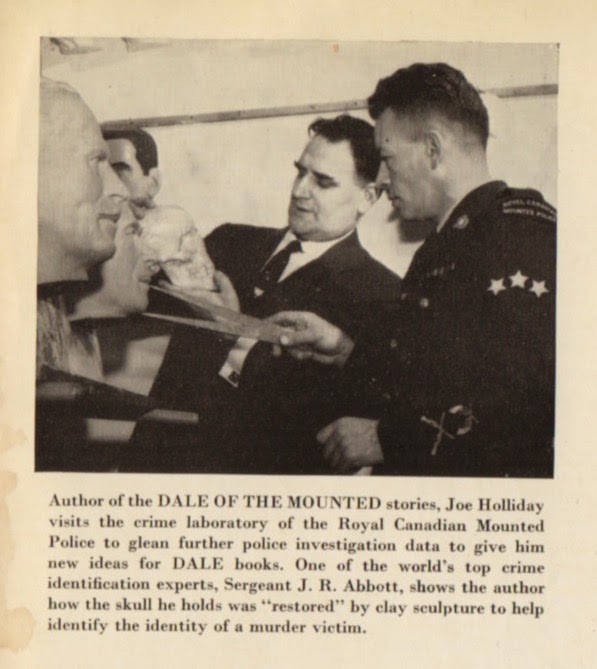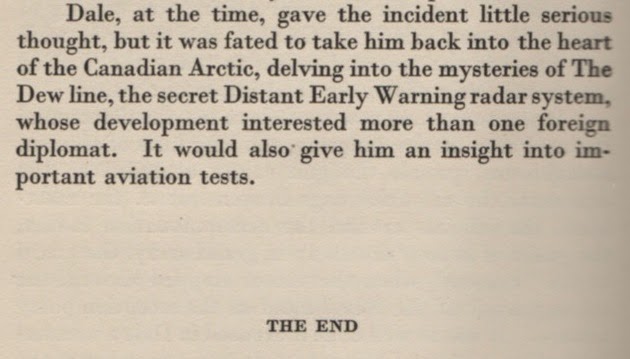Dale of the Mounted: Atlantic Assignment
Joe Holliday
Toronto: Thomas Allen, 1956
First off, I should make it clear that the book I really wanted to read is
Dale of the Mounted: Atomic Plot. Published in 1959, it involves a Pakistani scientist, East Indian religious fanatics and a terrorist attack on Canada's Chalk River nuclear research facility. I read
Dale of the Mounted: Atlantic Assignment only because it turned up in our local library's most recent used book sale.
 |
The Globe & Mail,
1 November 1952 |
That I haven't come across any others says something about the passage of time, I think. Dale of the Mounted books were once very popular, each landing in early November so as to take advantage of Christmas gift giving. Having been born the year the series ended, I never received one myself, but I remember a friend's older brother having a few.
Dale of the Mounted is Constable Dale Thompson. His "Atlantic Assignment" follows
Dale of the Mounted in Newfoundland as the sixth adventure in six years. As in the previous book, Dale sets aside his Red Serge to adopt the guise of a journalist. Where in Newfoundland he was on the trail of Portuguese smugglers, here Dale investigates suspicious incidents that have taken place on HMCS
Pegasus, Canada's newest aircraft carrier.
Was there really a time in which it fell to the RCMP to investigate possible crimes of sabotage aboard Royal Canadian Navy ships? If so, would that task have been entrusted to a constable? And why is Dale a constable, anyway? After all he accomplished in the previous books, isn't a promotion long overdue?
These were the first questions raised in reading
Dale of the Mounted: Atlantic Assignment. Though not answered, by the end of the first chapter they'd been supplanted by another that I simply could not shake: How is it that Dale is still alive?
If
Dale of the Mounted: Atlantic Assignment is anything to go by, the constable should've died in the series' first book. His end might have come at the hands of a foe or while cleaning his gun, but he would be dead.
Dale never gets a chance to investigate past incidents. He's newly arrived on the aircraft carrier when a mysterious fire breaks out, destroying two planes. The challenge in describing what comes next involves time; Holliday is never terribly clear as to just when events take place in this novel. His narrative is lost in irrelevant facts and figures. These aren't presented as red herrings, rather they serve to pad.
Dale learns all about sonobuoys,
the Habbakuk Project, Pratt & Whitney Wright Cyclone engines, and a navigation and interception computer invented by an RCAF Wing Commander. One of the novel's 158 pages is devoted to the ins and outs of automobile ownership in Bermuda.
As the Mountie struggles to stay focussed, he's easily outpaced by his lone suspect, a mechanic named Joe DeMarco. The
Pegasus loses three more planes, though this does not prevent the carrier from participating in a "United Nations sea exercise". The ship's commanding officer takes it all in stride:
The plane was lost.
When the young Mountie said how impressed he was with the part that aircraft carriers played in the war games Captain Grayson smiled. He liked anyone who thought that carriers were the finest things afloat.
Captain Grayson likes Dale so much that he readily follows the young Mountie's advice. When dynamite is discovered in DeMarco's toolbox, Dale suggests they play a waiting game:
"I've a hunch that DeMarco can't plant any kind of time bomb unless he has plenty of time to do it. Unless I'm badly mistaken, the movies tonight will give him that big chance. Let us attend the movies. I'll keep within sight of DeMarco. I'll watch every move he makes. If he leaves the flight deck I'll follow him."
DeMarco does leave the deck. Dale follows but is knocked out cold (for the second of three times). The next morning, the mechanic manages a flight off the carrier, resulting in the loss of yet another plane.
As it turns out, DeMarco is one of two fifth columnists. The Mountie doesn't get either man. What happens is that the first saboteur kills the second, then plunges to his death in a kamikaze-like attack on the
Pegasus. It's only through a bizarre accident that the carrier is saved. The attacks were the work of a Balkan "dictator country" – though why it targeted the
Pegasus is anyone's guess.
The novel ends improbably with a chance meeting between Dale and the Secretary of State for External Affairs. I was distracted by the narrator's cock up in referring to the latter as a diplomat – five times in less than a page – so didn't quite recognized its importance as a set-up for the series' next book. I was put right by the lamest of endings:
The promised adventure,
Dale of the Mounted: DEW Line Duty, arrived in stores the following November. Five more adventures followed. The series ended in 1962 with
Dale of the Mounted in Hong Kong, in which Dale is finally killed.
Okay, I don't know for a fact that he dies – but, really, dumb luck can only last so long.
Dedication:
For The Men Of The
Royal Canadian Navy
particularly the crew of
HMCS BONADVENTURE [sic]
(aircraft carrier)
Trivia:
 |
| The Globe & Mail, 14 November 1953 |
 |
| The Globe & Mail, 26 November 1955 |
 |
| The Globe & Mail, 17 November 1956 |
 |
| The Globe & Mail, 15 November 1958 |
A bonus:
Object: A 158-page hardcover in burgundy boards with dark blue type. The dust jacket illustration is by Bob Turnbull. My copy was once presented as a Christmas gift.
I've not been able to identify Wayne or Alan.
Access: Sixteen of our university libraries have copies, as do the Toronto Public Library and Library and Archives Canada.
An American edition, published in 1959 by Pennington Press of Cleveland, Ohio, features a whole mess of illustrations by a man named Bill Humrickhouse. Canadian children had to use their imaginations.
Both the Thomas Allen and Pennington editions can be found online at prices ranging from US$3.50 to US$26.25. The Vermont bookseller trying to get $65.00 for her "Very Good" copy in "Good" jacket is ignored.
Update: I'm reminded by
Ralph Mackay of
Chumley & Pepys On Books that comedian
Dave Broadfoot's Sgt Renfew of the Mounted was forever being knocked out.
His catchphrase: "When I regained consciousness…"

























